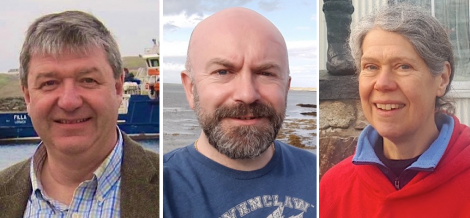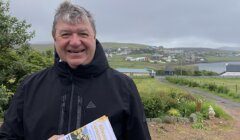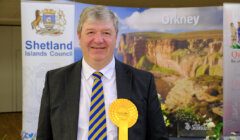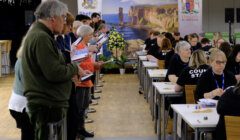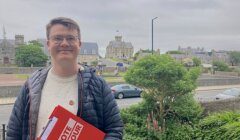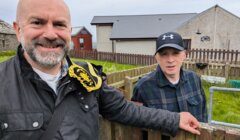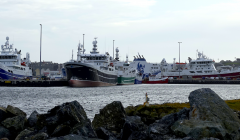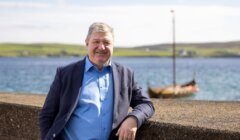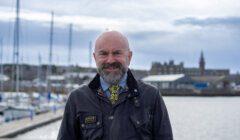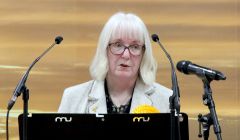Election / Candidates enter last week of election campaigning
WITH just a few more days until the general election on 12 December and all the hustings on Orkney and in Shetland done with, candidates have been campaigning on a number of issues close to their heart.
Lib Dem candidate Alistair Carmichael used the opportunity to launch into the SNP, the party’s main rivals in the Northern Isles, after the Institute for Fiscal Studies (IFS) found that the SNP manifesto policies were uncosted and were likely to require significant budget cuts and tax increases in order to reduce the deficit.
“The IFS findings are a bombshell. They strike at the heart of nationalist claims to be able to avoid tax rises and spending cuts in an independent Scotland,” he said.
“It seems that austerity for Scotland is perfectly fine if it is SNP-led austerity. The suggestion that SNP policy would also lead to increasing inequality only compounds the potential harm.
“The SNP like to say they offer an ‘escape’ for Scotland. This looks more like escaping the frying pan to fall into the fire.”
The SNP have defended its spending plans as ambitious and wide-ranging, adding that it would end austerity and invest into the NHS.
The party’s candidate for the Orkney and Shetland seat, Robert Leslie, meanwhile, called for a detailed plan to tackle climate change and create green jobs in the Northern Isles.
“At the start of this campaign I said that nobody should have to choose between heating and eating when we have so much renewable energy potential on our doorstep,” Leslie said.
“OIC has declared a climate emergency and I understand the SIC plans to. As a community we need to get together and define a detailed plan of action for what our emergency response should be.
“Under the SNP’s new proposals, the long-term certainty required by renewable energy projects will be guaranteed, bringing an end to Westminster’s side-lining of the renewable industry.
Become a member of Shetland News
“We have a moral responsibility to tackle climate change and to lead the way in showing how our society can transition to net zero while creating economic opportunity and providing the assurance of rewarding work for all.”
Alistair Carmichael, meanwhile, has backed industry body RenewableUK’s manifesto which includes calls for continued expansion of existing renewable energy production, investment in renewable innovation, and support for Ofgem to take decarbonisation into account in its operations.
“Backing the renewables manifesto is the right thing to do for our communities. Developing renewables isn’t just essential in fighting climate change. It is a vital and growing part of the sustainable economy in the Northern Isles,” he said.
“Local people stand to benefit directly from the Lib Dem plan to generate 80 per cent of our electricity from renewables by 2030.
“In the Northern Isles there are many companies and organisations already leading the way. We must do more to support their growth, in close partnership with the communities involved. If we work together there is massive untapped potential.”
Labour candidate Coilla Drake, meanwhile, spoke about the party’s policies on Brexit and its potential effects on the various industries in Orkney and Shetland.
The possible Brexit deal could range from no deal, a hard Brexit to a soft Brexit, which could all mean quite different things for the area, she said.
A no deal would mean no arrangement for a future relationship with EU, World Trade Organisation rules, the Good Friday Agreement for peace in Northern Ireland being jeopardised and severe economic shock, Drake said.
A hard Brexit would mean a deal with no membership of the single market or the customs union, while a soft brexit would entail a deal where we remain in a customs union but are not a member of the EU.
“That is why Scottish Labour believe we should remain. The other options would be too damaging to our economy. But we are still willing to put a credible Brexit option and the choice to remain to the British people and let them have the final say,” Drake said.
“Among fishermen, leaving the EU has generally been considered to be beneficial as it would mean an end to the Common Fisheries Policy.
“However, this would not mean the end of regulation as coastal nations will still have to comply with international regulation on conservation of fish stocks and have mutual agreements on fishing in each other’s waters.
“In addition, landing fish in Europe would become more complex. Labour will redistribute quotas along social and environmental criteria and require the majority of fish caught under the UK quota to be landed in UK ports.”
She went on to say that Labour would maintain agricultural and rural structural funds but repurpose them to support environmental land management and sustainable methods of food production.
Additionally new regional banks would provide access to funding and the Green New Deal policies would encourage generation of renewable energy on farms and transition from fossil fuel driven equipment to green alternatives, she said.
More information to all six local candidates – the other three are David Barnard (independent), Jennifer Fairbairn (Conservatives) and Robert Smith (Brexit Party) – standing in the 12 December general election can be found on our Meet the Candidates page.
Become a member of Shetland News
Shetland News is asking its readers to consider paying for membership to get additional perks:
- Removal of third-party ads;
- Bookmark posts to read later;
- Exclusive curated weekly newsletter;
- Hide membership messages;
- Comments open for discussion.
If you appreciate what we do and feel strongly about impartial local journalism, then please become a member of Shetland News by either making a single payment, or setting up a monthly, quarterly or yearly subscription.






